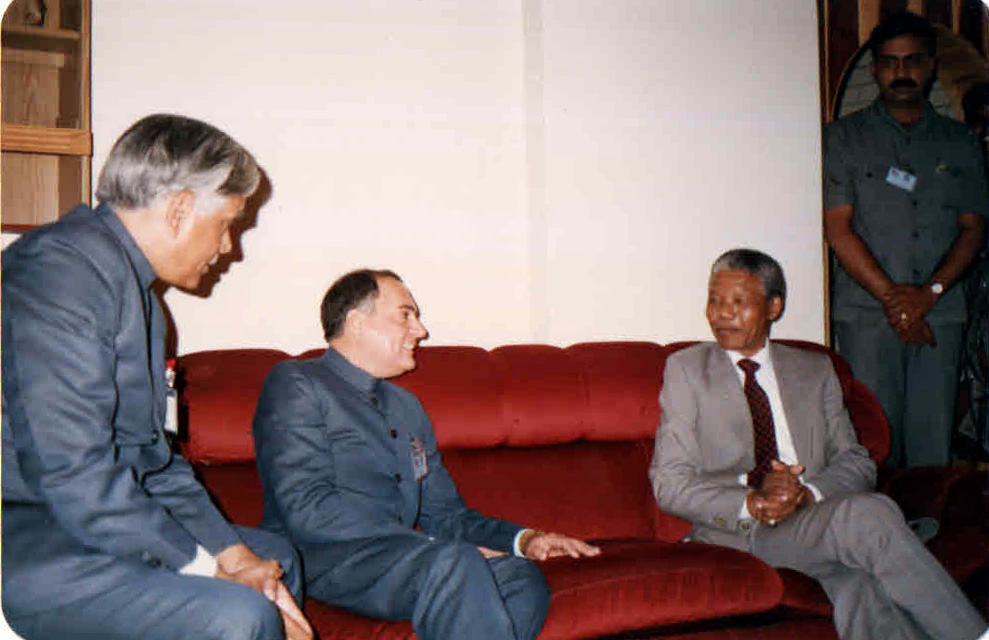While Nelson Mandela was a genuine admirer of Mahatma Gandhi, he writes, ‘In India, Gandhi had been dealing with a foreign power that ultimately was more realistic and farsighted. That was not the case with the Afrikaners in South Africa.’
I had the honour and privilege of meeting the great Nelson Mandela several times. While in hospital last week I re-read his autobiography, Long Walk to Freedom. Out of it dropped out a photograph taken in Windhoek, capital of Namibia. In it are Mr Nelson Mandela, Rajiv Gandhi and myself. All there were attending the celebrations of the declaration of the independence of Namibia (pre-independence day South West Africa) on 21 March 1990.
Many heads of state and heads of government had been invited. Mr Nelson Mandela, who had been recently released from his twenty-seven years in prison, was the star attraction. Rajiv Gandhi was invited in his personal capacity. He asked me to accompany me.
The second item was a copy of a newspaper report of the Indira Gandhi prize award ceremony at the Rashtrapati Bhavan on 27.1.1995. “The Vice-Chairman of the Indira Gandhi Memorial Trust, K. Natwar Singh faced a difficult situation. President Mandela was not scheduled to speak but on arrival decided to do so. In the list of speakers were, Mrs Sonia Gandhi, the Prime Minister, the Vice-President, the President, Archbishop Huddleston, recipient of the prize and K. Natwar Singh. The sophisticated diplomat he is, K. Natwar Singh did some quick thinking on his feet and announced that President Mandela transcended protocol and was free to speak when he wished. President Mandela spoke immediately after Mrs Sonia Gandhi.”
While Nelson Mandela was a genuine admirer of Mahatma Gandhi, he writes, “In India, Gandhi had been dealing with a foreign power that ultimately was more realistic and farsighted. That was not the case with the Afrikaners in South Africa. Nonviolent passive resistance is effective as long as your opposition adheres to the same rules as you do. But if peaceful protest is met with violence, its efficiency is at the end. For me, non-violence was not a moral principle but a strategy. There is no moral goodness in using an ineffective weapon. But my thoughts on this matter were not yet formed, and I had spoken too soon.”
He was out of tune with the National Executive Committee: “When they learned of my speech. I was severely reprimanded for advocating such a radical departure from accepted policy… The executive admonished me, noting that the impulsive policy I had called for was not only premature but dangerous. Such speeches could provoke the enemy to crush the organization entirely while the enemy was strong and we were still weak. I accepted the censure, and I hereafter faithfully defended the policy of non-violence in public. But in my heart, I knew that non-violence was not the answer.”
I am a genuine “bhakt” of Gandhiji, but I have from time to time asked myself, would non-violence have worked in Hitler’s Germany, Stalin’s Soviet Union or Tojo’s Japan. Obviously not.
***
The generals who now rule, actually misrule, Myanmar are amazingly unimaginative, totally insensitive, thick headed and out of touch with the world. They are however a dangerous lot. But this time round they have not succeeded in intimidating the vast number of supporters of Aung San Suu Kyi in all parts of the country. Perhaps they are heeding warnings of the US, UK, UN, France, India and other countries. The US and UK have already imposed sanctions. Others too might also do so. Myanmar, in that case would face a stark future.
What is amazing is that these medal wearing generals (by the way, for which war did they earn them?) should be so fearful of a seventy-five-year-old lady, daughter of the father of the nation and herself a world celebrity.
Why are the ASEAN countries being so timid? Do they really support the unjustified arrest of Aung San Suu Kyi? What is happening in Myanmar is not simply an internal matter. It is a serious violation of human rights. This is surely clear to ASEAN countries.

